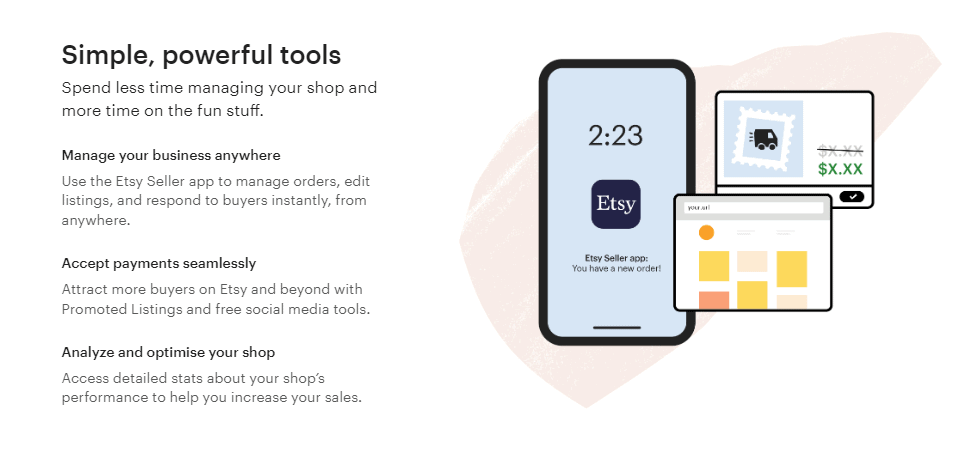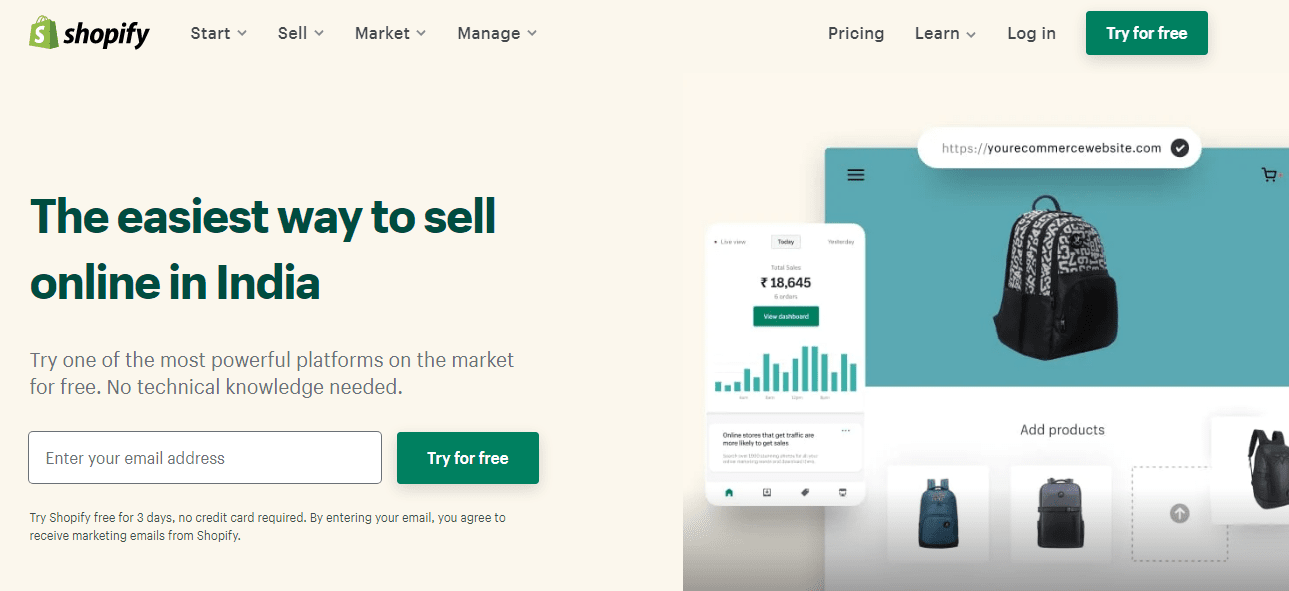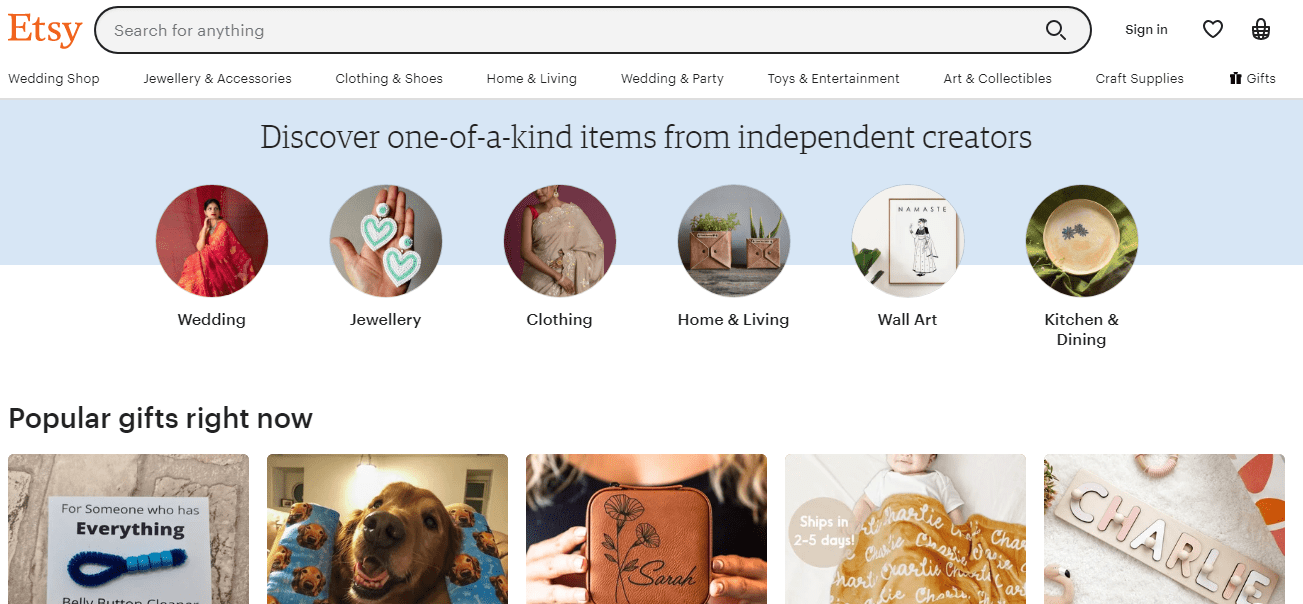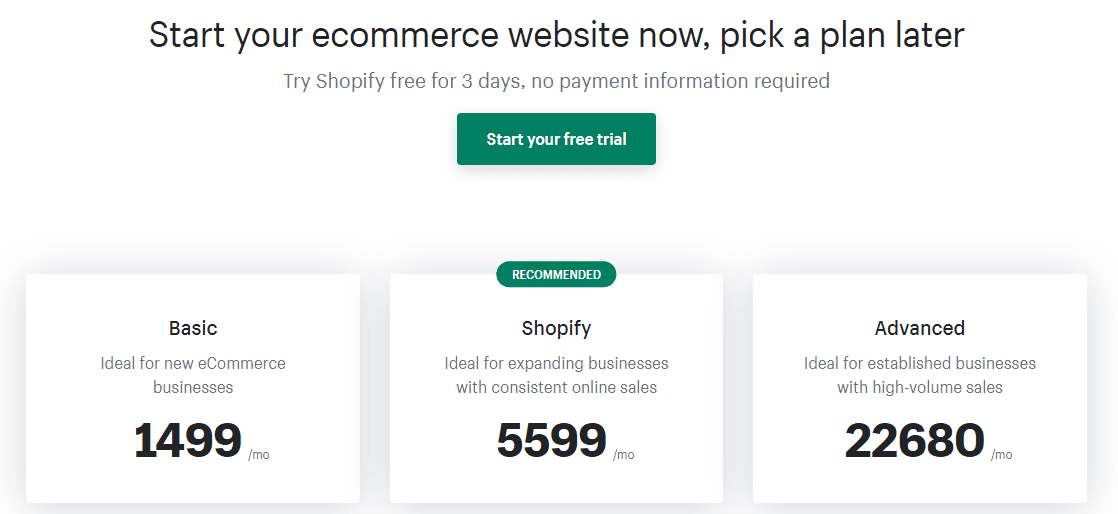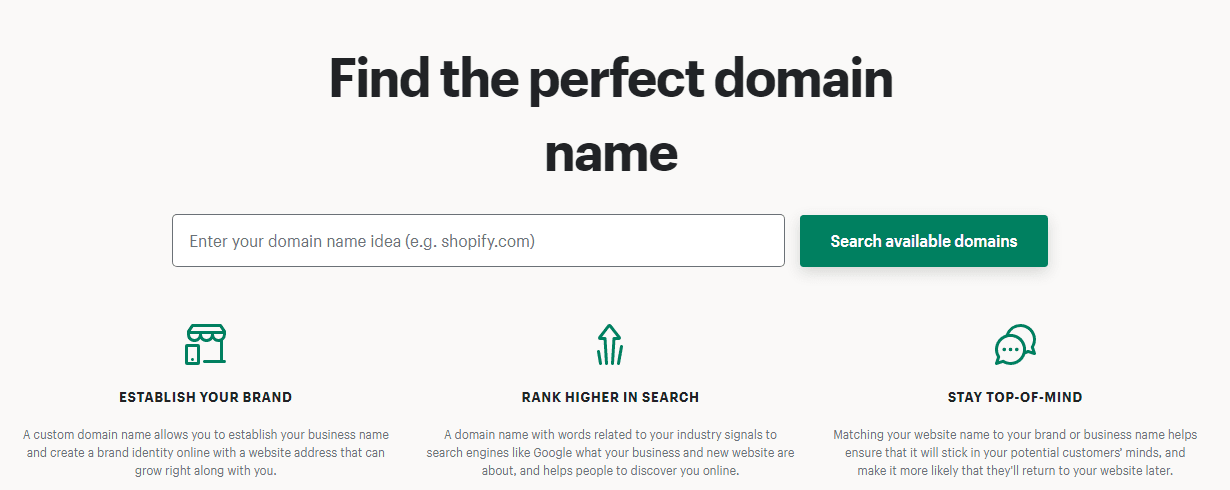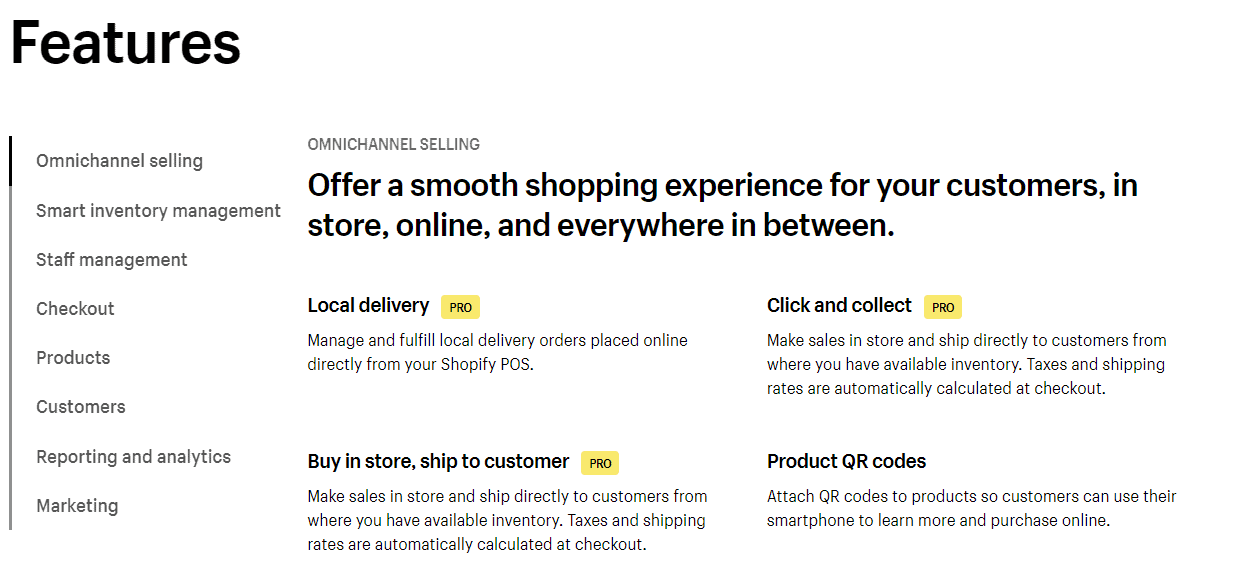Is Shopify superior to Etsy? Both Shopify and Etsy are distinct in their own ways and well worth the investment of time and money.
Shopify, widely recognised as the greatest eCommerce platform, allows you to construct robust online storefronts.
Etsy functions as a marketplace in which e-merchants register for online kiosks and share selling space with others.
In this instance, we may conclude that Shopify is superior to Etsy based on an examination of the data.
However, this is not always the case; it should always be contingent on how users organise their businesses, establish objectives and budgets, etc.
This post will provide a comprehensive answer for you. Let’s get started!
Shopify vs Etsy Overview
What is Shopify?
Shopify was founded in Canada in 2004 and has since evolved to become one of the finest eCommerce platforms. Shopify is a fully-hosted solution that makes it easy for you to launch your own online store.
As of August 2022, Shopify is currently powering over 4 million live websites, providing e-merchants with unprecedented capabilities while preserving a pleasant customer experience.
Its primary objective is to enable merchants to easily construct their own websites and begin selling without any technological expertise.
Quick update on Shopify 2022: Currently, Shopify no longer offers a 14-day free trial; instead, a 3-day free trial is available. After that, you can enrol in the promotion “$1 per month for three months” using the Shopify Basic plan.
What is Etsy?
Etsy, on the other hand, has been an extremely popular online marketplace since its launch in 2005. Similar to Amazon and eBay, you must create an account in order to display your products.
Online purchasing on Etsy would be a great option for people seeking to start small.
The market will require you to focus mostly on product development, customer retention, and marketing.
However, it comes with a lack of store management, brand expansion, and scalability, which will be discussed later in the essay.
Etsy Pattern – Etsy’s website platform edition was released at the end of 2016, enabling users to sell custom goods on their own independent websites.
With Etsy Pattern, there are fewer product restrictions than on the Etsy marketplace. Pattern is free to try for 30 days, after which a $15 monthly fee applies.
Due to the nature of online marketplaces, it would be ideal to sell simultaneously on Shopify and Etsy. When your Shopify online store is integrated with Etsy, the ability to manage inventory and orders is simplified.
A listing tool for Etsy facilitates the integration of Etsy with your Shopify store and reduces the amount of repetitive work required.
Shopify or Etsy: Which One is Better?
1. Shopify fees vs Etsy fees
Shopify fees
Are you new to Shopify? Shopify offers a 3-day free trial, so there’s nothing to worry about.
There will be extremely user-friendly onboarding instructions so that you can rapidly discover what Shopify can accomplish.
After then, you must pay for Shopify according to a tiered pricing structure that corresponds to the three scalability tiers.
Shopify pricing plans
Shopify’s three main plans are:
- Basic Shopify – $29/month
- Shopify plan– $79/month
- Advanced Shopify – $299/month
The more expensive your plan, the more features you can unlock.
Shopify imposes transaction fees in addition to the monthly fee for each plan. Shopify costs $2.9 plus 30 cents per transaction for the Basic plan.
The fee is reduced to $2.6 plus 30 cents for Shopify and $2.4 plus 30 cents for Advanced Shopify.
Registering for an annual plan could save your business a substantial amount of money over time.
You can save 50% on an annual subscription (only for the first year) and 20% on a two-year subscription.
Etsy fees
“Is Etsy free?” is a question frequently asked by sellers. However, Etsy charges a small fee when you list items or fulfil an order. Etsy’s standard plan does not require you to pay monthly operating expenses.
However, a portion of your earnings must be set aside for listing and transaction fees. The exact amount for listing fees should be $0.05 per item listed.
This amount will cover the costs associated with publishing and displaying your product for several months, or until it sells.
You will be charged a 6.5% transaction fee and an additional 3% plus $0.25 for payment processing on every item you sell.
In addition, Etsy offers off-site ads to promote your products, for which you only pay when you make a sale.
Finally, you have the option to pay for the Etsy plus upgrade version. It’s where you’ll find an expanded set of tools to kick-start your business’s growth and express your brand.
Verdict: Etsy’s lack of monthly costs is its primary benefit over Shopify; nonetheless, Etsy’s transaction fees are far higher than Shopify’s.
In the comparison of costs for selling on Shopify vs Etsy, Shopify comes out on top due to its characteristics that allow merchants to create a comprehensive online store at an inexpensive price.
2. Ease of use
Shopify – Ease of use
Whether you have experience selling on other eCommerce platforms or are new to online commerce, Shopify makes it incredibly easy to get started.
It is simple to comprehend because hosted solutions like Shopify are so much simpler than self-hosted alternatives.
Shopify is not the simplest platform available, but it simplifies the process of creating an online store. Obviously, you won’t have a website live in five minutes!
However, Shopify manages to combine significant eCommerce tools with an editor that even absolute beginners can use.
After creating an account on Shopify, you can set up your store by following its straightforward steps.
Adding products, creating your store, and selecting your store’s settings are the three key processes you will need to do. You may find a tutorial on how to quickly set up Shopify for beginners here:
Etsy – Ease of use
Etsy makes things significantly simpler. Simply register and upload your products and information, and you’re ready to sell on Etsy!
Probably the most time-consuming process is uploading products because it requires a great deal of information.
Etsy’s overall setup costs require less work than Shopify’s. Therefore, it is ideal if you are seeking speed and simplicity in online selling.
Verdict: Is Shopify superior to Etsy? Etsy is the clear winner when comparing Shopify vs Etsy in terms of usability.
Compared to Shopify, this marketplace allows merchants to list and sell products in a matter of minutes. Shopify is still simple to set up, but you will need to scale as your sales increase.
3. Domain and URL structure
Shopify
Shopify domain name, You will be required to create a domain name for your website when registering to sell on Shopify.
During the trial period, your website’s address will include “myshopify.”
After selecting a plan, you will immediately receive your custom domain name without the “myshopify” prefix.
It also indicates that you own the domain and that it is exclusive to your website, making it a potent component of your brand. On Shopify, a custom domain name costs $11 per year.
Shopify promotes the creation of custom domains for websites. It is essential for establishing that your brand is reliable, recognizable, and professional.
It also makes it much easier for customers to locate your websites compared to stores in a space-sharing environment.
Possessing an independent website with a custom domain allows you to invest in SEO, which is crucial for long-term growth.
Etsy
When selling on a marketplace such as Etsy, you cannot have a custom domain as Shopify does.
Instead, your store’s URL should seem as follows: www.etsy.com/shop/shopname. This could lead to scenarios in which your customers are required to peruse sites before entering your store.
Additionally, it is inconvenient if you intend to create a brand.
Verdict: Shopify assists merchants in clarifying their brand names more effectively than Etsy. Your brand identity will expand with Shopify and you will have full access to all customer data.
The brand awareness or differentiation of your business is extremely difficult on Etsy, even if your products are unique.
4. eCommerce features
When deciding between selling on Etsy vs. Shopify, the presence of eCommerce features is essential. It determines whether or not you will have the ability to manage your business and increase your sales.
Shopify – eCommerce features
Even with its basic plan, Shopify’s all-in-one solution provides sellers with an astounding number of features. Here is a list of some features that come with every Shopify plan, including:
- Gift cards
- Discount codes
- Abandoned cart recovery
- Blogging
- Shopify point of sale
- Multichannel selling
- Overview dashboard
- SSL certificate
- Dropshipping
- Finance report
- Fraud analysis
- Management of inventory and orders
- Online storage and bandwidth without limits
Multi-channel selling is one of the most important features for increasing your exposure to potential customers.
Abandoned cart recovery notifies customers if they were close to completing a purchase but abandoned the checkout page. This allows you to ensure that no sales are escaping your grasp.
SSL certificate is essential for secure online transactions. This contributes to building credibility and trust with prospects. On every plan, an SSL certificate will serve as the default method of authentication.
Shopify is the platform with the largest app store on the market, with over 7000 apps, so you can find everything there.
Etsy – eCommerce features
Etsy does a good job of equipping you with the necessary tools to manage your store with ease.
The “Sell on Etsy app” allows you to manage orders, update items, and communicate with customers while on the go.
Etsy also offers promotional tools that generate traffic, expand the customer base, and increase brand followers.
Etsy is adept at recognising the importance of performance analysis for a company.
In fact, Etsy includes the analytics report feature in every plan by default, displaying comprehensive data on performance trends and traffic sources.
By upgrading to Etsy Plus, you gain access to the following additional features:
- Your own domain can be created
- Multiple banners and layout options are available for advanced shop customization
- Benefits and discounts
- Customers are notified by email about item availability
Verdict: Comparing Shopify and Etsy based on eCommerce features alone, Shopify is unquestionably superior to Etsy.
Shopify’s greater feature availability may be accompanied by higher fees compared to Etsy. If you want to keep things simple and small, Etsy’s fundamental features are sufficient.
5. Design flexibility
There should be no doubt that neither Shopify nor Etsy excel at design flexibility. However, there are important distinctions between the two to consider.
And Shopify has more stock to make your web design more appealing.
Shopify
With Shopify, you have access to 102 themes, 9 of which are free and 93 of which are expensive.
All of these themes are accessible in the Shopify themes store, which is continuously updated with new themes.
After selecting a theme, you can change the home page’s content area.
In addition, all Shopify themes are optimised for search engines and mobile devices, which is crucial for enhancing the user experience.
You can easily switch between themes at any moment, while certain themes require content reformatting.
Shopify themes
Paid Shopify themes range in price from $150 to $350 and support a variety of business types, allowing you to select the most suitable for your website. Minimal, Debut, and Supply are three of the most popular free Shopify themes.
Etsy
In contrast, your store’s layout and style will mirror those of Etsy. Sometimes, the absence of design interference is a good way to eliminate concerns.
You can be confident that Etsy will always use its best efforts to make your store clean, responsive, and appealing.
On Etsy, there is no room for customisation. Simply enter your store’s name, submit your logo and product images, and add product descriptions.
If you don’t have a logo yet, use a logo maker to complete the task quickly.
Verdict: Clearly, with so limited design options on Etsy, it is difficult to make your store the centre of attention. You can choose a Shopify theme with numerous advanced features, either for free or for a fee.
6. Help and support
People at Shopify are enthusiastic about quickly resolving the issues of sellers. For higher-tier plans, you can even access your own support team.
Shopify provides assistance on several channels to help you choose the optimal approach. In particular, it provides:
- Customer service is available 24/7
- Support for social media
- Live chat support is available 24/7
- Forum for the community
- Support via email
- Center for Help
- Tutorial videos
- Support from a specialist
There are fewer options available on Etsy. You can find solutions to your issues in the Help Center, which displays information in a very organised and legible manner.
There is an active forum on Etsy where you can participate in discussions and obtain helpful advice from other users. Email and direct phone contact are also available as support options.
Verdict: Shopify wins this round due to its dedicated support staff.
Quick Links:
- Thrivecart vs Shopify
- The Ultimate Guide To Setting Up An Instagram Shop
- List Best Shopify Product Hunt Tool For High ROI
- How To Make And Sell Digital Printables On Etsy
- Best Dropshipping Stores
- Spocket Dropshipping Review
- ThriveCart vs WooCommerce
- Best Thrive Leads Alternative
- LinkTrackr Review
- ThriveCart Review
- How To Start A Business Through Ecommerce
- Best Facebook Ad Spy Tools
Final Comparison Shopify vs Etsy 2024
Despite the fact that Etsy is cheaper and easier to use out of the box, Shopify ultimately prevails.
Because of this, you need an eCommerce platform that will work when you begin selling online and scale up as your sales grow.
Shopify is superior to Etsy in both regards. Etsy could be an excellent choice if you operate a small business. Shopify is the ideal platform, however, if you wish to drastically increase your sales.



